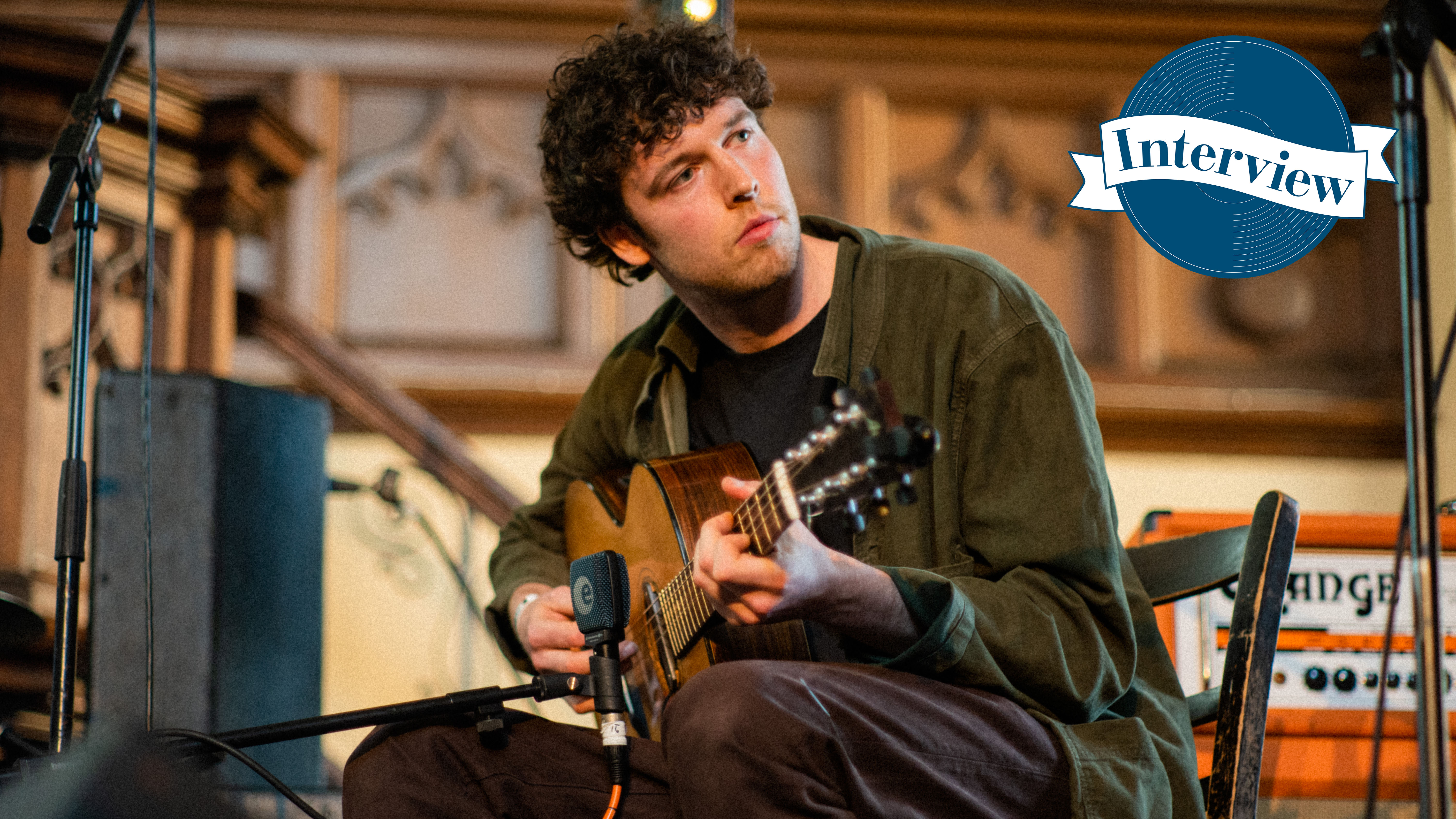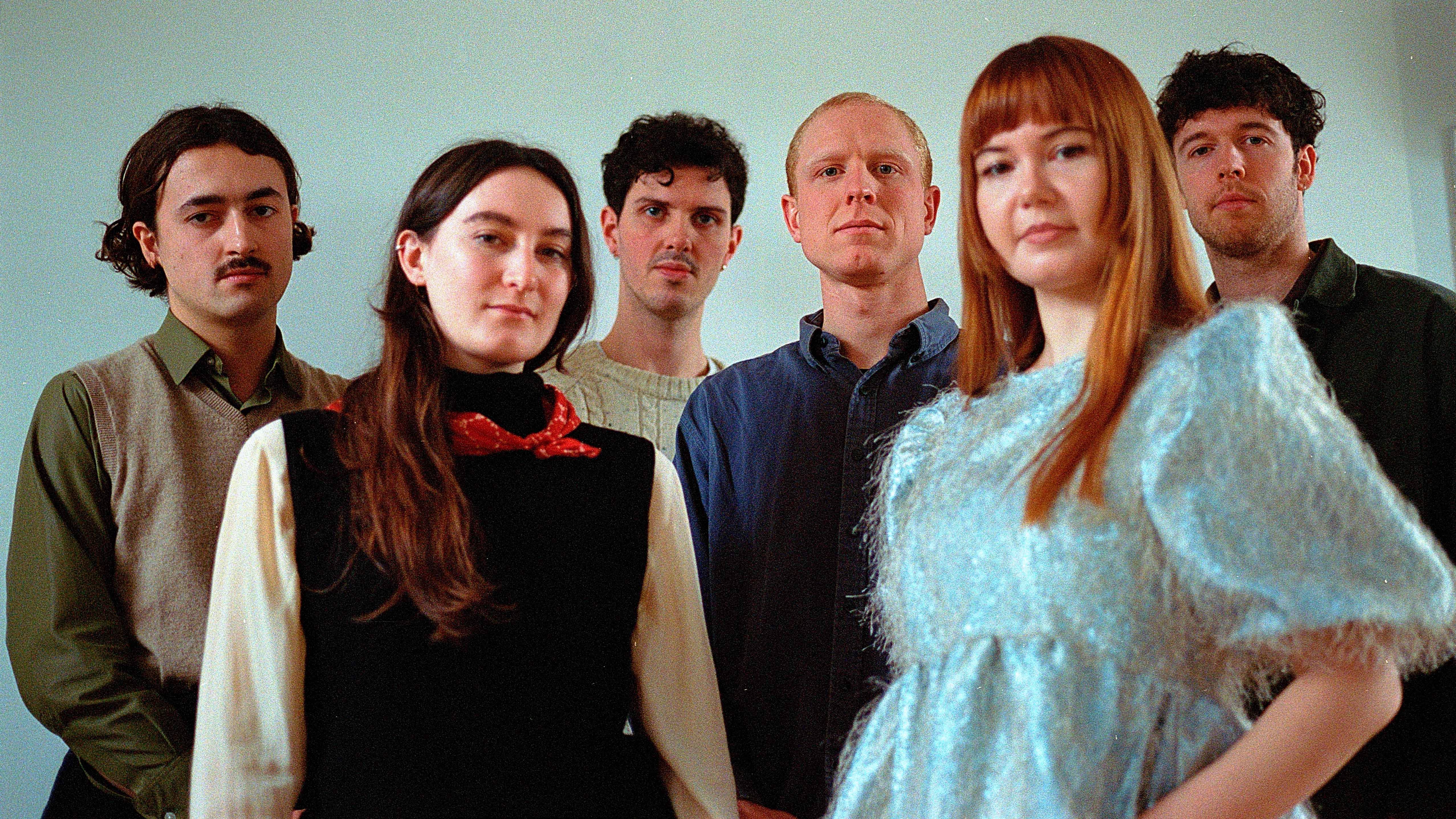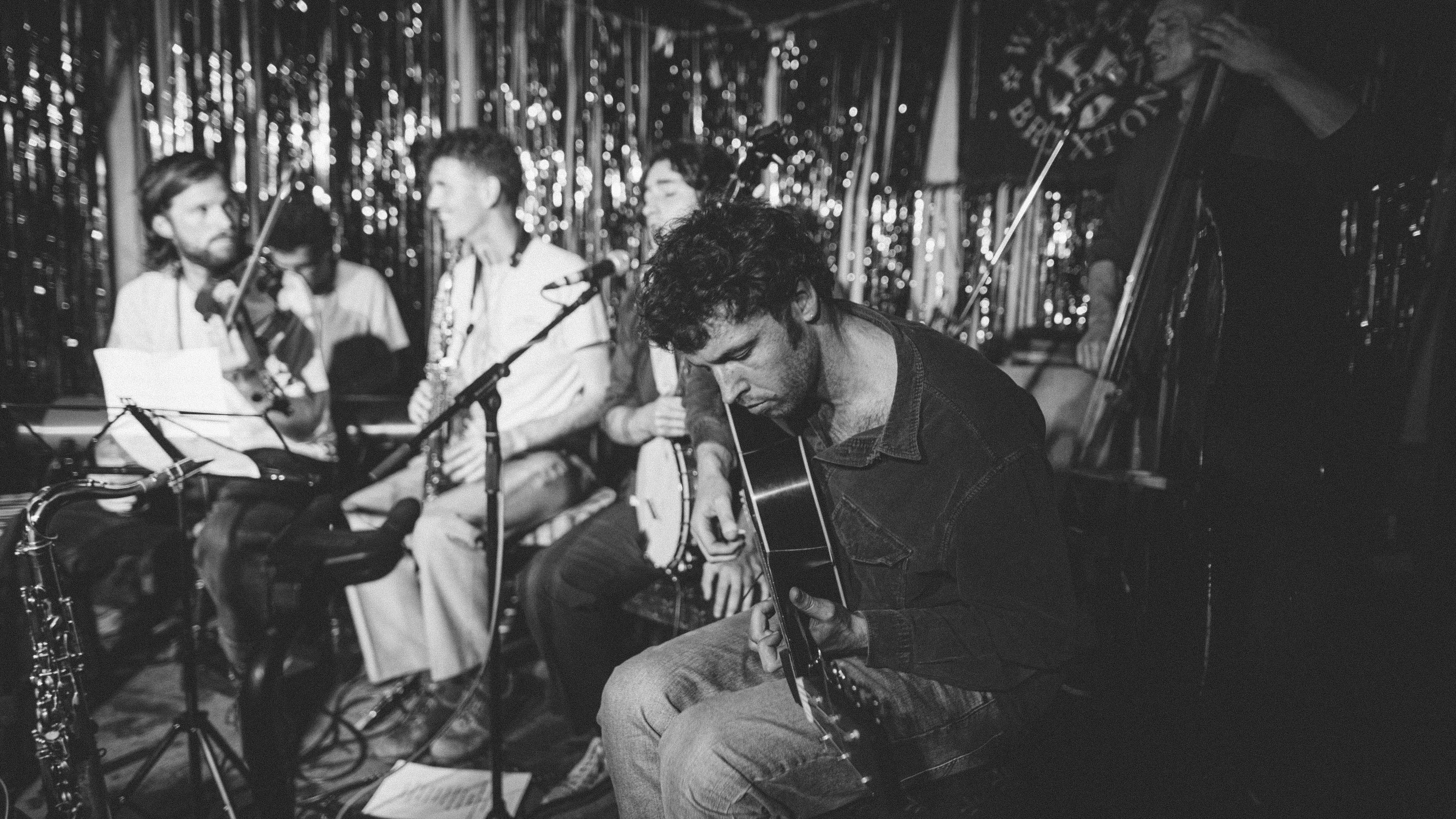
If you're used to the concept of a four- or five-piece band, Broadside Hacks will be a head-scratcher at first. They're a collective of young musicians, founded by Sorry's Campbell Baum, many without a deep background in traditional music. They first gathered in London for an informal, inclusive folk night, and they're still a collective rather than a band, but now they're recording and touring.
"In comparison to the bands in and around London that we often perform alongside, this is definitely one of the most fluid where the lineup is concerned," notes guitarist Sam Grassie. "None of the group have a one hundred percent attendance record and we've accumulated deps for most of the core lineup now."

Not only does the idea of a fluid membership fit with the inclusivity of what folk music should be, it actually frees the band musically and logistically.
Some of the group make more frequent appearances than others, but the door's always open for people to return if they take some time away from it," adds Sam.
"People's commitment to Broadside Hacks depends solely on how busy people's calendars are, and lineups are put together on a gig-by-gig basis."
Those gigs will include Kite Festival in Oxfordshire on 12 June, Glastonbury Festival on 24 June, Latitude Festival on 23 July and King's Place in London on August 25 at the premiere of The Broadside Hack – a documentary film about them.
"Everyone that has been involved is a great musician with real passion for music. Whenever someone new joins we’re all excited to see what they’ll bring to the set, whether it be through their choice of song or their style of performance"
The interchangeable lineup also means the chemistry and dynamic shifts within Broadside Hacks, but is founded on a core strength.
Want all the hottest music and gear news, reviews, deals, features and more, direct to your inbox? Sign up here.
"Everyone that has been involved is a great musician with real passion for music. Whenever someone new joins we’re all excited to see what they’ll bring to the set, whether it be through their choice of song or their style of performance."
Grassie is one of the more familiar faces of Broadside Hacks, bringing a childhood of traditional Scottish songs and a more contemporary passion for seminal British folk guitarists including Davey Graham and Bert Jansch. And it hasn't gone unnoticed. He was recently chosen by the Bert Jansch foundation to be allowed to perform with one of the late guitarist's main performing guitars, a Yamaha LL11e.
So there's lots to talk about – including the band's love of interpreting and giving new life to forgotten folk songs for a whole new audience, a forthcoming Broadside Hacks debut album proper (2021's Songs Without Authors was more of a collaborative compilation) and even a documentary film.
I would get totally absorbed when attempting fingerstyle pieces
When did you first discover Bert’s music and what impact did it have on you?
"My earliest memory of listening to Bert was hearing In This Game in my Uncle’s car, I would have been about 6. I remember thinking he was like the thorny stem of a rose, against other acoustic players I had heard. I stuck with the Red Hot Chilli Peppers for a while but, when I returned to his music having got better acquainted with the guitar, the uniqueness of his playing became even more apparent.
He’s obviously part of an incredible lineage of British folk players – what made you gravitate towards acoustic folk playing?
"I love the immediacy of playing acoustic instruments, that it can just be picked up off a chair and played. My dad was always playing Irish tunes on his flute in our toilet (for the acoustics) and, while I enjoyed playing accompaniment to trad, I would get totally absorbed when attempting fingerstyle pieces."
What players besides Bert have had a particular impact on you?
"Davy Graham’s an easy name to drop here, but actually when I listen back to myself I don't hear much Davey in there, he was a very precise player. I’ve spent a long time trying to emulate Bert and I’d need to spend the same time again to begin to tackle Davey's style.
"Alongside the obvious John Renbourn, I would say Pierre Bensusan and more recently Derrick Gripper; in particular his transcription of Kora music onto classical guitar. You could spend a lifetime exploring any one of these players style.
Angie has been interpreted by players, including yourself, what does it mean to you?
"Truthfully I don't think many people have put much of a new spin on it, most just try to play it like Bert. It is great that so many people improve their handle on the instrument as a result of wrestling with the piece, though. It’s a great foundation for composing music and reminds me to not get bogged down in making something overly complex, that the groove should be at the fore."
What guitar of Bert’s did you choose from his Kilburn studio and why did you gravitate to it?
"I was given his performing guitar, a Yamaha LL11e. The Bert Jansch Foundation very kindly allowed me to perform with it at various festivals with Broadside Hacks. Yamaha make stellar guitars and you can tell this one has really been played in."
I guess out of respect to the tradition there's been a hesitance to inflect the reels and jigs with our own musical personalities but it’s started to happen organically in recent gigs
What are your own main instruments and what do you look for in an acoustic guitar?
"I blame lockdown for turning me into a guitar hoarder. I have an Atkin that was made for Eddie Reader which is brilliant for celtic fingerstyle, a Martin OM 28 for songwriting and a Fylde Cittern that I use for accompaniment in broadside hacks. I like something visually understated with rosewood back and sides."
What are the biggest challenges with finding a place for the acoustic in the mix with other instruments live?
"This was subject to much discussion between myself and Joel [Burton, Piano] in the van last week. It is funny how often a guitar led band produces records wherein the guitar is almost inaudible.
"In terms of live performance I have yet to crack it. D.I sounds terrible and mic's terrify sound engineers. My current preference is to use a DI for fingerstyle led tunes and to just use the mic for strummed accompaniment."
We have started to incorporate some structural elements that might be more commonly associated with jazz than folk, so we’ll see where it goes
You had a background in traditional music when you were younger but do you feel that some of the Broadside Hacks collective’s members not being rooted in traditional influences has allowed a kind of freedom with arrangements and approach?
"It has been great rediscovering trad music with the folk club and Broadside Hacks, and a lot of laughs. There was some confusion in the early rehearsals as to whether 'jigs' and 'reels' were the names of songs.
"When it comes to arranging traditional song it's been exciting to see everyone's different approach. I guess out of respect to the tradition there's been a hesitance to inflect the reels and jigs with our own musical personalities but it’s started to happen organically in recent gigs. That’s something I’m keen to see develop."
Do you see any parallels with what Broadside Hacks are doing to blur genre lines with Pentangle’s work?
"While there are obvious similarities that arise whenever non-folk musicians engage with folk, a lot of what we do is still within the framework of verse, solo verse (partly due to the restrictions that come with a frequently changing lineup). We have started to incorporate some structural elements that might be more commonly associated with jazz than folk, so we’ll see where it goes."
My previous group was just acoustic guitar, harp and double bass, so it’s been a jump going from that to an ensemble as big as this one
Do you see Broadside Hacks as a kind of touring folk club, in a sense?
"A folkie from Isle of Arran came to see us in Glasgow and described it as exactly that!"
Hearing how every instrument works together but has space in your arrangements as a collective, what have you learned as a guitarist from the experience so far?
'My previous group was just acoustic guitar, harp and double bass, so it’s been a jump going from that to an ensemble as big as this one. I’m gradually learning less is more and to always keep listening to what’s happening around you."

It feels like new, fresh interpretations of traditional songs are crucial to bringing them to new audiences. How do you approach arrangement with this in mind – is it a very democratic process through playing together?
"Someone tends to bring an arrangement and we just jam it out. Everyone has their say and when our slot comes to an end, whatever’s there is played. It usually takes a few plays of an arrangement on stage for it to reach its final (or not so final) form."
How do you go about finding the more obscure traditional songs to interpret?
"I know Campbell found some of what made it onto Songs Without Authors through books he picked up in charity shops. Compilations such as Topic's Voice Of The People are another good way to discover songs, if you like to be uninformed of the harmony you'd hear in more contemporary renditions."
I think people like that they’re never going to go to a Broadside Hacks gig and it be the same setlist or same lineup
You’ve been able to play festivals where traditional folk songs would rarely be heard, what’s the reaction been like from audiences and do you think it could inspire people to investigate the history further?
I like to think we’re contributing to keeping that communal spirit of Folk music alive, something that's very much alive in sessions but maybe less so on festival stages. I think people like that they’re never going to go to a Broadside Hacks gig and it be the same setlist or same lineup. It’s not the cleanest show you’re ever going to see, but the spirit’s always there.
In terms of people connecting with the lineage of the songs, we make an effort to credit the singers or performers we learned the songs from. We judge it on the show though, if we’re in the flow sometimes we’ll just play on.
Can we expect a non-compilation album from the collective in the future?
"I think that’s next on the list!"
Can you tell us anything about the forthcoming documentary you’re involved with called The Broadside Hack?
"The documentary focuses on a group of London-based artists (caroline, Shovel Dance Collective, Thyrsis and ourselves) and to what extent traditional music has had on our various projects and how we came to find it.
"We shot it at Peter Gabriel’s Real World Studios last summer. It was produced by British Underground who are real champions of British music and span all genres. They’re responsible for getting us over to SXSW too, which we’re hugely grateful for.
"It had its first outing at SXSW in March, but we’ve just announced the first London screening at King's Place on August 25th."
See Broadside Hacks at Kite Festival on 12 June, Glastonbury Festival on 24 June, Latitude Festival on 23 July and King's Place in London on August 25.
For more information visit Broadside Hacks.

Rob is the Reviews Editor for GuitarWorld.com and MusicRadar guitars, so spends most of his waking hours (and beyond) thinking about and trying the latest gear while making sure our reviews team is giving you thorough and honest tests of it. He's worked for guitar mags and sites as a writer and editor for nearly 20 years but still winces at the thought of restringing anything with a Floyd Rose.